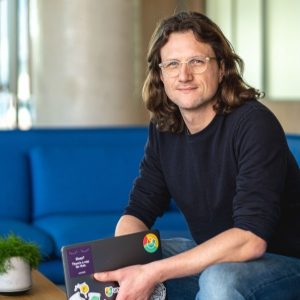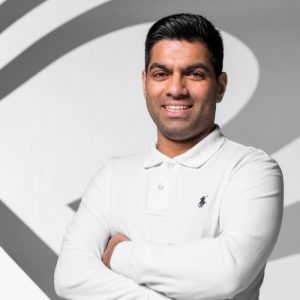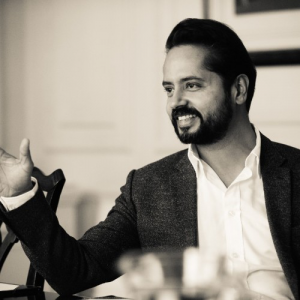HealthTech is fast becoming a huge sub-sector of the tech industry, growing exponentially over the past year especially. In fact, the HealthTech industry is currently speculated to be worth around £24 billion.
But what is HealthTech? HealthTech refers to the incorporation of tech in facilitating the delivery, payment and development of healthcare services.
We wanted to talk to some of the big players in the HealthTech space, to hear about what inspired them to start their companies, talk about the growing sector and find out where they think it’s headed.
Our Panel of HealthTech Experts:
- Dr Nick Taylor, CEO & Co-Founder at Unmind
- Wais Shaifta, CEO at Push Doctor
- Ranjan Singh, Co-Founder & CEO at HealthHero
- Alison Meadows and John Dibb, Co-Founders at PDH
- Scott Erwin, Founder and CEO at HireHand
- Teun Schutte, Managing Consultant of Digital Strategy Healthcare at Mobiquity
- Rick Rowan, Founder and CEO at NuroKor
- Dr. Elina Naydenova, CEO and Co-Founder at Feebris
- Aahuti Rai, Chief Commercial Officer at Ampersand Health
- Dr Chris Whittle, Founder and CEO at Q doctor
- Rudy Benfredj, Co-Founder and CEO at Mendelian
- David Newns, Founder and Chairperson at Prevayl
- Adi Jacobson, VP Marketing at Zebra Medical Vision
- Justin Bingham, Co-Founder at Janeiro Digital
- Ross Harper, CEO and Co-founder at Limbic
- Vadim Fedotov, Co-Founder at bioniq
- Caroline Noublanche, CEO and Co-Founder at Apricity
- Ethar Alali, CEO at Automedi
- Fiona Law, Partner of Potter Clarkson
- Michael Niddam, Co-Founder and Managing Director of Kamet Ventures
For any questions, comments or features, please contact us directly.

Dr Nick Taylor – CEO & Co-Founder at Unmind

“The mental health tech landscape today is unrecognisable to just five years ago. We believe there have been four key drivers behind this trend. The first is accessibility: technology has democratised the health industry – enabling people to proactively seek professional help from their devices. Second is destigmatisation: online mental healthcare provides a safe space for people to get scientifically rigorous support without fear of judgement. The third is measurement: technology enables us to analyse our minds, visualise the findings and make meaningful steps towards nurturing it. Fourth is demonstrable impact and outcomes: businesses using workplace mental health tech can now prove the return on investment (ROI) to initiatives like never before. Together these trends have catapulted the industry forward in the last five years.
And the rate of change and innovation is increasing. In the last few months alone, we’ve seen mental health gain something like parity with physical health as a topic on the national consciousness. In the next five years, we’ll see that technology is to mental health what gyms are to physical health. The demand for HealthTech is increasing in all areas of life, from workplace mental health tech to running apps. As technological developments increase in line with our appetite for wellbeing, the future looks bright for the industry. “
Wais Shaifta – CEO of Push Doctor

“Over the last twelve months the digital health landscape we operate in has evolved rapidly. This has been spurred on by the pandemic, which has brought wholesale changes to the way we all interact with healthcare. The biggest change we’ve seen, however, is the surge in demand for digital health services like online GP appointments. In the early stages they were crucial to avoid spreading the virus, but since they have become critical in providing additional capacity and resilience for primary care, particularly during the vaccine roll-out.
“But beyond their use during the pandemic, the benefits of video consultations are clear. We expect to continue to see their uptake in 2021, providing patients with faster and more flexible access to clinicians, practitioners with the tools to better manage their time, and the NHS with significant cost savings.
“For Push Doctor, the future of healthcare is making systems more sustainable and joined up for the long-term and using what we have more efficiently through digital technology, as a partner of the NHS.”
For any questions, comments or features, please contact us directly.

Ranjan Singh – Co-founder & CEO of HealthHero

“Covid-19 has spurred on incredible growth for the healthtech industry. By the time the pandemic has passed, it’s thought healthcare systems will have undergone a decade of change in just a few months. Remote consultations including those conducted via telephone and video were already on the up prior to the pandemic, with the number conducted from Mar-Nov 2019 vs 2020 increasing by 50 million. The use of remote services continued to increase during lockdowns, a trend also seen with online prescriptions.
Now, nearly 9-in-10 GP prescriptions are issued electronically – a significant rise compared to the 20% year-on-year growth GPs reported before the crisis. From triaging patients and diagnosing acute conditions to facilitating video consultations and detailed health data analysis, the capacity for healthtech solutions to create efficiencies and remove frictions is substantial. It’s no exaggeration to say these technologies have helped clinicians save lives during the crisis, so it’s imperative the sector continues on this trajectory and doesn’t revert back to the old way of doing things.
Looking to the future, I think the pandemic has shown there is vast potential for healthtech to enhance the current role of medical practitioners, ensuring patients receive a more comprehensive program of care. I believe once the dust has settled, people will find it difficult to go back to the old way of doing things and the use of tech will become the new normal, with healthcare globally becoming digital-first within the next few years.”
Alison Meadows and John Dibb – Co-Founders at PDH

“Above all, we want to make a difference in people’s lives.
For years we have both worked to help companies make money and attract new customers via our marketing agencies. But now we want to help others to become healthier and happier, no matter what stage of their life they’re at.
It’s important to approach healthcare holistically. Far too many health/wellbeing companies are only looking at one area: mental health or physical health. But there’s no need to pick a side. Our minds and our bodies are so interconnected, and they should be treated as such. For long-term health and wellbeing, the mind and the body must be treated at the same time.
Equally, we must prioritise prevention. We strongly believe in helping people to stay fit and well without the need for costly interventions. If you give people the right tools, education and generate a greater desire to be accountable for your own health, then we’d have a healthier, fitter nation. Digital is the perfect enabler and Covid-19 has accelerated people’s acceptance of this.
Patients can only take better control of their own health and wellbeing when the Health Tech sector gives them that power to do so. Once the power has been gained, traditional barriers the NHS has in place currently can be removed, which will allow greater space for patients to make more decisions about their own health and wellbeing treatment – as we have successfully done in South London, with the Diabetes Book & Learn platform.
Where is it going? In a word, digital. COVID-19 has forced the health sector into the 21st century and it’s well overdue. Digital Health is only set to grow further and fast, as the NHS and the numerous organisations within it realise the huge benefits.
As a sector, we have a long way to go to change and embrace digital healthcare but we’re glad we’re on the road. We will continue to lead the way with our “best in class PMS” and our new apps that will be coming to the market in 2021.”
For any questions, comments or features, please contact us directly.

Scott Erwin – Workforce Optimisation Expert and Founder and CEO of HireHand

“The coronavirus pandemic has expedited the advancement of the HealthTech Sector. What would normally have taken years to implement has been done in a matter of months to deal with the overwhelming numbers of patients who have needed care.
Our health care workers are the heroes of this pandemic and as such we were driven to help them work as efficiently as possible. We realised our intelligent shift matching software would enable shifts to be filled quickly and seamlessly, in the dynamic environments now being experienced. Our SaaS includes proven, focused shift matching algorithms, powerful enough to find the uniquely best match on a job by job, person by person, location by location basis – instantly; without compromising flexible workers. We joined the healthcare sector to solve the problem of increasingly more dynamic staffing, and our software is now offering GPs and PCNs in the NHS, plus health districts in the US, respite in the difficult task of scheduling shifts and coordinating staff members and volunteers for the vaccine rollout.
The future of healthcare depends on seamless integration of technology, with overfilled wards and a shortage of hospital beds and staff, a connected world, with smart use of technology will ensure that patients are seen and treated quickly and easily. Staffing such a complex and dynamic sector needs technology and our software is perfectly designed to ensure the right person is in the right place at the right time.”
Teun Schutte – Managing Consultant of Digital Strategy Healthcare of Mobiquity

“From a young age, I have been immersed in healthcare. My father and grandfather were physicians, which inspired me to work in the healthcare industry. Since I started my career, nearly two decades ago, healthcare has changed rapidly with digital health and MedTech transforming patient experiences.
As a digital healthcare and strategy leader, my work with healthcare providers, pharmaceutical companies and hospitals has enabled me to witness the positive impact of digital innovation in healthcare. Indeed, prior to the COVID-19 outbreak we were already seeing the benefits of human-centric digital healthcare across the industry. Our work with the Princess Máxima Center, a fully specialised hospital for children’s oncology in the Netherlands, is just one example of many innovations that have helped to improve patient outcomes. We developed a digital application which provided interactive support for families during the different phases of a cancer diagnosis and allowed families to integrate treatment, as much as possible, into their daily lives.
Following the pandemic, COVID-19 has transformed digital healthcare. From remote monitoring and video consultations to mobile apps and wearable tech, patients and doctors across the world have been forced to embrace digital health technologies – out of a necessity to stay safe from infection. As someone who has been working in this field for nearly two decades, we have seen more change in the past eleven months compared to the past eleven years. So, what does the future hold for healthcare?
Once the COVID-19 vaccine has been rolled out successfully, the healthcare industry has the opportunity to optimise the first generation of these digital tools. There is still work to be done, and through digital innovation healthcare companies will be able to transform patient outcomes – reducing inefficiencies in healthcare delivery, improving access to GPs, and increasing the quality of patient care – both remotely and in a physical care setting.
The future of healthcare must therefore build on the momentum that exists in digital health and MedTech, and continue to adopt innovative, disruptive digital health technologies that improve patient outcomes, while future-proofing a blended approach that combines digital and physical treatment pathways.”
For any questions, comments or features, please contact us directly.

Rick Rowan – Founder and CEO of NuroKor

“My route into health tech was very personal. I started NuroKor two years ago, born out of my own struggle with chronic back pain – a problem that first arose when I was a child, and by my teenage years had become at times a totally debilitating issue. After attempting to manage my condition with a variety of anti-inflammatory drugs and other painkillers, I eventually refused to accept that this would be my long term future and set out to find another way to treat chronic pain that didn’t involve a cocktail of often harmful medicines.
It was along that journey that I first started to learn about bioelectronics – the notion that electricity, applied to the body in various ways, could relieve pain and stimulate recovery and healing of tissues. Fast forwarding to today and NuroKor is creating bioelectronic software for clinical and therapeutic application via wearables for patients all over the globe.
It has been a monumental year for our healthcare industry. COVID-19 has brought unimaginable challenges to the delivery of all aspects of health and community care. As such, the need for innovation in the healthtech space has never been greater. The demand for more streamlined patient pathways; quicker access to effective treatments and increased localised healthcare services has increased ten-fold, and healthtech has true potential to address many of those needs.
One significant trend we have seen this year – and something we predict will only continue to grow – is the number of healthcare professionals who are funding innovation in healthtech brands with their own personal investment. Their knowledge of clinical medicine is incredibly important in making smart investment decisions – knowing how technology will be used and adopted by clinicians and patients, as well as how it is purchased or procured, can be the difference between success and failure.
This influx of clinicians to various levels of investment means that the capacity for informed decision-making is increasing and this is critical for future-proofing the growth of the healthtech sector.
It is also important, particularly during COVID times, that we do not underestimate the importance of pharmacies and the role they play as the gateway to healthcare services; this is especially true when more broadly, the NHS is under significant pressure. As highly qualified healthcare professionals, pharmacists are able to provide advice and support without the need for patients to speak directly to a doctor and overtime, we’ve seen the arrival of online pharmacy services which mean that people can access advice, medicines and treatments without the need to leave their home.
With the increasing efficacy and interest in remote monitoring and interventional solutions – like NuroKor’s bioelectronics clinically-validated device that supports management of chronic and acute pain – healthtech has also decidedly put the power of managing health and wellbeing firmly in patients’ own hands. Again, this approach also means that people can be empowered to confidently address their own health needs, without the need for direct input from an overstretched health service.”
Dr. Elina Naydenova – CEO and Co-Founder of Feebris

“I have always been dedicated to improving healthcare through innovation. I want to live in a world where no one has to suffer from a treatable condition simply because they cannot access a doctor. It was this that motivated me to complete a PhD in Healthcare Innovation at Oxford University and afterwards, I launched Feebris.
At Feebris, we have always been concerned with how access to healthcare can be delivered in some of the most challenging environments for the most vulnerable patients. Originally, we focused on enabling the early detection of respiratory issues in children in urban slum communities in India. We then evolved, working collaboratively with clinicians, social care and public health professionals to develop and calibrate our AI-powered technology that can rapidly assess and triage health issues in patients with co-morbidities, such as elderly patients in care homes.
Our user-friendly, mobile health platform uses algorithms to monitor a person’s health status through medical sensors like digital stethoscopes and pulse oximeters, which perform a ‘check-up’ and alert a healthcare professional (HCP) directly if attention is required. Crucially, this can be completed in the community by individuals that do not have formal clinical training. Anyone who has been trained with our device can perform the check-ups, saving valuable clinical time and resources. This has been especially pertinent during the pandemic for the elderly – our technology has been deployed into multiple care homes across East London allowing their staff to triage their patients and ensure that anyone who needs further care can receive it.
The Covid-19 pandemic has really accelerated the embedding of technology across patient pathways. The real challenge for healthtech will be to prove that the new workflows created during the pandemic are here to stay. For this to be the case, innovators should continue to improve the usability, performance and health economic benefits of their solutions. Technology itself is only a tool. Healthtech needs to focus on solving problems with solutions and services that can be agile and adapt to the capability and capacity needs of our already overstretched health and social care services.”
For any questions, comments or features, please contact us directly.

Aahuti Rai – Chief Commercial Officer of Ampersand Health

“I’m impact driven so healthtech was a natural career path, it’s both humbling and rewarding to see tangible benefits for the patients we work with. It’s a constantly evolving sector brimming with innovative companies amongst which Ampersand Health stood out for me . It’s a fast growing, social-impact, company, pioneering the development of behavioural and data-science based digital therapies for people with immune-mediated diseases like Crohn’s, Ulcerative Colitis, Arthritis and Psoriasis.
Ampersand Health was born out of a desire by clinicians to solve a real problem for their patients, initially fuelled by grant funding, their original vision has expanded to make a positive impact to patients, clinicians and the healthcare ecosystem as a whole. Healthtech has the ability to augment care in ways which reflect the pattern of disease and the needs of patients managing those conditions, more patient initiated follow up (PIFU) not only empowers patients to help themselves, but we also ensure that those patients that need care get it, and get more of it, thus alleviating pressure on the already overstretched NHS. I see this as the way ‘humanised-healthtech’ will continue to evolve, to offer patients a more personalised patient-led approach to their care, while also recognising the responsible use of drug interventions where needed. This holistic approach to treat the patient considers their experience and their quality of life as a whole.”
Dr Chris Whittle – Founder and CEO of Q doctor

“As a doctor myself I experienced first hand the challenges within healthcare, that can be solved by healthtech and this is what led me to start Q doctor in 2015. We are now the UK’s leading video consultation service and our aim is to make it easier for people to access important health advice and care when and where they need it securely. The Covid-19 pandemic has lifted many of the barriers to digital transformation within our healthcare system out of a necessity, Q doctor has enabled clinicians to revert to remote working, whilst still providing effective care, keeping the public and healthcare professionals safe.
We are proud to have a longstanding partnership with the NHS, we were recently selected by NHS Digital as one of the centrally funded vaccine booking solutions that passed its stringent assurance selection process and is therefore available to GP practices, PCNs and CCGs free of charge. For me, the introduction and implementation of IT and technology platforms that help facilitate easier ways for patients to be seen and treated remotely is key. However, this requires large quantities of sensitive patient data to be stored virtually, meaning data security becomes absolutely paramount.
We continuously assess our cyber security with internal and external testing, as well as the NHS frameworks, accreditations and toolkits such as; the Data Security and Protection Toolkit, for example, where we publish our practices, and Cyber Essentials Plus, which is an information governance accreditation that we have achieved. I anticipate we’ll see a lot of progress made in this space as the impact of the pandemic continues to mean that both patients and clinicians are calling out for ways to communicate in a safe and secure way.”
For any questions, comments or features, please contact us directly.

Rudy Benfredj – Co-Founder and CEO of Mendelian

“Healthcare is one of the last industries to adopt a digital approach, this has changed in recent years and the current pandemic has highlighted an urgent need for traditional healthcare services to utilise healthtech solutions rapidly.
At Mendelian we enable better clinical care through earlier rare disease diagnosis. On average, in the UK it takes 5 years before a patient receives a diagnosis of a rare disease, while this journey is long and stressful patients it is also costing the NHS, in the past decade alone, undiagnosed rare diseases have cost in excess of £3.4 billion.
For many years diagnosis was a kind of lottery, if you happened to live near a doctor or hospital that specialised in your particular disease the chances of you being diagnosed quickly were much more in your favour. What digital technology offers is the potential to translate some of this analogue knowledge held by specialist consultants, books and research papers into a digital format that enables access to healthcare to become more scalable, equitable and democratised.
Our Software MendelScan, a Class 1 Medical Device, uses state-of-the-art technology, data capture and the latest medical knowledge to enable and improve rare disease diagnosis.”
David Newns – Founder and Chairperson of Prevayl

“I’m really interested in making a radical, positive impact in the world. So I look for big problems that can be solved by visionary ideas. We’re in a situation now where medical science has improved rapidly, raising life expectancy around the world. But as longevity increases, healthcare systems face huge disruption from growing demand for their services, rising costs and a workforce that is struggling to meet the needs of its patients. Healthcare can’t keep up. So for me there’s a huge opportunity to innovate in preventative healthcare. Simply put, I want to help millions, or billions of people make positive changes in their life that will keep them out of the healthcare system as much as possible.
The self-care revolution
What will help most is if patients take better care of their own health and avoid getting ill in the first place. To do that, you need to get far more data from them, and be able to structure it and act on it – all with as little medical professional intervention as possible.
Smart wearable technology, like a Fitbit or Apple Watch, has taken a good first step in this regard. These devices continuously monitor some health data such as heart rate and calorie burn, they allow people to set health and fitness goals, and some data can be shared with medical professionals. But what excites me is how we take wearable technology to a whole new level.
The human body is so nuanced, and individuals so different, that small variations in your heart rate, core temperature or heart rate variability can be significant. So how can you get more abundant individual data, in more depth and with greater accuracy than a wrist band? The answer is clothing. It covers far more data points than a wrist band and can potentially pick up for information.
That’s why I co-founded Prevayl, to re-think clothing and evolve it from this transient role to playing a smart, active role in your health. So we’ve developed clothing that can read far more data, with greater accuracy than any other ‘wearable’. Additionally, we use machine learning to crunch the data and turn it into precise insights and actions with the help of health professionals. But, to drive mass adoption and make a huge impact, smart clothing not only needs to be technologically visionary, it also needs to be fashionable.
Making healthtech fashionable
Recently Vogue’s archive editor Laird Borrelli-Persson pointed out that few designers have considered working technology into garments. “That integration of functionality and style is the new frontier, and the future,” she wrote. For me, and the team at Prevayl, taking a fashion-first approach is critically important – it’s how we make this ground-breaking technology accessible to the mass market. That’s why the garments are first and foremost beautifully designed. They feel and look amazing. But on top of that, they give you actionable insights about your mental and physical health. And this lets you decide to make positive choices and actions that improve your wellbeing. Normal fabrics just don’t offer that.
Smart clothing is one of the most exciting healthcare opportunities we have. Not only is it a radical change for clothing and fashion, but also a revolution in preventative healthcare. When improving your health becomes as simple and seamless as putting on our clothes, we’ll be able to make health gains on a level we’ve never seen before. “
For any questions, comments or features, please contact us directly.

Adi Jacobson – VP Marketing of Zebra Medical Vision

“My bachelor degree was in Biology, I always had a clinical oriented type of interest and thought I’ll seek a career in medical research. During my Masters degree I realized lab-life wouldn’t be enough. I needed a people oriented position that in its core value
helps educating markets and raising awareness for health tech solutions that can truly improve our well being and potentially save lives. Once I took the first steps at the medtech space I knew I found my home. I’m still excited by new products till this day.
I have a deep connection to how it can help drive value based care and transform the way patients are treated, elevating patient care to new heights, and that’s why I’m on a mission and absolutely love my position at Zebra Medical Vision. AI is poised to change
the way we screen large populations to identify chronic diseases, placing these patients in preventive care programs, and preventing disease progression.”
Justin Bingham – Co-Founder of Janeiro Digital

“The future of digital transformation is complicated; We currently use and share information through centralised services, from big tech companies such as Facebook and Google, to every day service providers we rely on, such as our banks and insurance companies. As a result, the data we share is owned by these companies, used for their profit and siloed in a way that leaves users with no control over their own information, or the ability to put their own data to work with other applications for their benefit.
At Janeiro, our vision is to harness the decentralised web to address this need for greater personal data value and security, and build transformative solutions for the individual as well as the collective.
This shift enables communication and data sharing without relying on big tech. It allows people to become guardians of their own data and proactively make decisions about who it is shared with, and why. It opens the door to applications and services that can deliver new value back to the user through consented access in real-time. This also means that companies who require data can also benefit from highly accurate, real-time data sets without the risk of holding large amounts of sensitive and identifiable personal information.
We started this journey in the healthcare world to tackle one of the biggest data challenges of all time: giving individuals direct control and access to their most intimate data; their medical records. We enable consent-based collaboration between patients and carers, which allows healthcare professionals to access real-world, personalised data securely, to inform treatment and care management.
As a consequence, we are transforming healthcare data ecosystems by providing a secure, accessible and future-proof approach that connects patients and healthcare providers like the NHS. Our XFORM Health platform is the connective tissue that brings together the existing centralised world that our current health IT systems operate under. It links with decentralised personal data technologies like Solid Pods, allowing personal health data to be stored, shared and retrieved, creating a private, personal data exchange for clinical and patient-generated data. XFORM enables patients, and their selected collaborators the ability to feed data back into the health system to their clinicians.
Critically, this data protection model meets both UK government and NHS guidelines, whilst also complying with GDPR, and can therefore be deployed to any individual nationwide or even globally. The decentralised PODS can contain all different types of personal data from infinite different sources – although health, through partnerships with the NHS and pharma, is where we’re currently focusing our energy.
XFORM is sector agnostic and with that comes huge potential for integration of a new, safer, more secure and ethical approach to data sharing across every industry.”
For any questions, comments or features, please contact us directly.

Ross Harper – CEO and Co-founder of Limbic

“Mental illness is one of the biggest health issues of our time. It is the leading cause of disability in adults according to the World Health Organisation and costs the global economy $1 trillion annually in lost productivity. And yet, there exists a severe and urgent supply-demand issue in mental healthcare that must be addressed by digital solutions.
Prevalence of common mental illness is increasing. 1 in 4 people will experience a mental health issue in their lifetime. Correspondingly, the volume of patient referrals to talk therapy is also on the rise. However, the number of clinicians available has remained largely constant and many health professionals are leaving their posts due to burnout. This creates a profound need for digital solutions that can amplify the powers of clinicians to manage the growing mental health crisis.
Having completed a PhD in computational neuroscience, my passion is at the intersection of cognition and data. Unlike other areas of medicine, psychological therapy has yet to benefit from recent advances in the fields of machine learning and data science. I wanted to change this.
It’s not an easy task though. Psychological therapy has some fundamentally human aspects to it and as such, technological innovation within mental healthcare can only occur through augmentation rather than automation. I personally believe this fact is ignored by the vast majority of self-proclaimed ‘digital therapeutics’ for mental healthcare and wellbeing in the App Store today. The problem with these standalone solutions is that they rely on notions of substituting for a human therapist.
By contrast, Limbic is founded on the principle of amplifying the powers of human therapists to help more patients and tackle the supply-demand mismatch in mental healthcare. Our platform supports patients, clinicians and services throughout the care pathway, using AI. Starting from the point of referral, Limbic creates a patient record and triages new users to support clinical assessment. Throughout therapy, Limbic activates and engages patients in-between sessions with personalised content, while also sharing valuable data back to the therapist.
This is a really exciting time for mental health. In the coming years, I anticipate the emergence of sophisticated care pathway optimisation tools, combined with machine learning to yield greater personalisation and data-driven clinical decisions. Interestingly, these solutions can only grow through collaboration with healthcare services. By their very nature, they must learn from expert clinicians and cannot exist independently to ensure they receive the right level of industry engagement and validation. This is why our team collaborates with IAPT clinicians and psychologists, who help in developing our platform.”
Vadim Fedotov – Co-Founder of bioniq

“Around 2017, when I was responsible for corporate ventures at one of the largest media holdings in Europe, I started researching and analysing different industries and quickly identified that health and education (especially, online) sectors have a lot of opportunities. At the time, those industries were already growing in double digits and they continue to do so today. Given my former background in professional sports and interests in a healthy sustainable lifestyle, I decided to focus on health-tech myself.
The health-tech industry is predicted to reach around $510 billion by 2027 – this will be comprised of various niches including telemedicine, smart gadgets, AI and IoMT to name but a few. At bioniq, we have identified 3 key directions that we cannot ignore if we are to stay relevant in the long-term:
1) Focussing on smart data collection, which ensures we are able to provide personalised solutions to our clients
2) We have seen a change in consumer behaviour – people prefer to invest more in their own health (health is the new wealth)
3) We have moved from an age of standardisation to an age of personalisation in many aspects of life, including health and wellbeing”
For any questions, comments or features, please contact us directly.

Caroline Noublanche – CEO and Co-Founder of Apricity

“The healthtech industry is a highly innovative space dedicated to making the most personal and intimate aspects of our lives smarter, simpler, and more accessible. I’ve always been attracted to the vast scope for providing genuinely life-changing outcomes for our patients.
The idea for the virtual fertility clinic model that would later become Apricity developed from the lack of innovation and access surrounding fertility care and treatments, particularly the emotional and professional toll resulting from clinic visits that could be done at home.
This option for at-home treatments has taken centre stage over the last year, and naturally we’ve seen demand for our virtual fertility clinics and fertility advisors skyrocket during the pandemic. Healthtech startups have been able to step up to provide vital services during the lockdown, and now that people have experienced the benefits of personalised, on-demand healthcare it is likely that an increasing number of startups will enter the space to meet consumer appetites.
Over the course of the last year we’ve seen innovation on an unprecedented scale. As AI and ML capabilities continue to increase, I expect we’ll see more products on the market using these technologies to provide enhanced diagnostics tools, improve treatment outcomes, and to predict success. This is an area we are particularly focused on at Apricity, with the launch of our Fertility Predictor tool last year the first of several AI products planned.”
Ethar Alali – CEO at Automedi

“Consumer HealthTech products are everywhere. Fitbits, smartwatches and running apps helped 16 to 40 year-olds keep on top of health.
Inside healthcare, it is very different. The decade before March 2020 saw structural underfunding rarely deliver beyond-incremental improvements to existing equipment or digitisation. So it wasn’t surprising that Coronavirus mercilessly caught care supplies napping.
GPs and Consultants suddenly needed to work from home; Health science networks 3D printed face visors and ventilator parts; Apps launched to support mental health and track movement of the virus through people. Making 2020 the NHS’ most innovative year yet.
Automedi quickly realised the NHS has no emergency supply. If it broke, that was it. Simultaneously, the NHS has also has the UK’s biggest single carbon footprint. Building on previous social accounting expertise, Automedi set about modelling a brand-new sustainable supply chain to deliver products faster, reduce emissions and plastic waste. Finally deploying their 3D printing appliances into pharmacies in the North of England.
With funding from InnovateUK, we built and launched the first fleet into community pharmacies. Giving GPs, care homes and community teams an alternative supply that decouples them from competitive global demands.
But it’s much more than that. Automedi looks very differently at the problem. It is a health products circular economy. Bioplastic equipment is made in a fleet of IoT enabled, cloud-controlled 3D print appliances deployed at the point-of-care. Any waste is then recycled back into consumables used within the our fleet itself.
October’s “Towards a Net Zero Health Service” report form the NHS introduced ambitious plans to deliver a “net zero” health service by 2050. Encouraging number of greener companies into their supplier lists while continuing to innovate as rapidly as it has.”
For any questions, comments or features, please contact us directly.

Fiona Law – Partner at Potter Clarkson

“Regardless of the current climate, investors are looking for the next big disruptive technology. In fact, as a direct result of the pandemic, interest in healthtech has grown dramatically. Healthtech investments in the US and Europe reached $12bn in 2019, a sum that was matched by the end of Q3 2020, according to Silicon Valley Bank.
The desire for healthtech has escalated due to the coronavirus because people don’t want to go and see a doctor if it’s not essential, so they’re more willing to look for ways of eliminating that process. Cognitive Behavioural Therapy is one use case that’s been normalised through apps, for example – just look at Calm and Headspace. And with the absence of gyms at the moment, people are looking to healthtech to stay active and motivated.
However, we’re now entering phase two of healthtech – digital therapeutics – which is where digital health becomes a powerful and validated tool to complement traditional drug therapies prescribed by doctors. This means moving into the more science-driven end of the spectrum where the software is classed as a medical device and is regulated accordingly.
The vision is that we’ll get to the stage where both medicine and software work side-by-side, with doctors prescribing an app in combination with drugs to deliver a better therapeutic outcome for the patient. From an IP perspective, it’s all about access to and protecting health data and the software algorithms, but what will be particularly interesting is patenting the combined use of a drug alongside a digital therapy where that appears on the drug label.”
Michael Niddam – Co-Founder and Managing Director of Kamet Ventures

“Our mission as a venture builder is to create companies that can relieve or alleviate some of the pain points that people experience in their everyday lives. From the outset we identified Healthcare as a sector that was absolutely imperative to the fabric of society but that was in desperate need of innovation and digitalisation. We used this central thesis to build a team with deep industry expertise along with a network of scientists, academics, and sector operators to tackle some of the challenges of the modern day – fertility, ageing, remote care, diagnosis, and numerous others.
As we have seen over the past year, the pandemic accelerated the speed at which patients moved away from traditional in-person consultations and moved them to the digital plane. This created a lot of demand for existing companies such as Kamet’s Qare and introduced many new players offering telemedicine solutions. I strongly believe that as this market continues to grow, hospitals and customers need to be conscious of the quality of the experiences they provide and the guidance they deliver. If the user experience is unsatisfactory or lends to an excess of negative clinical outcomes, it risks slowing adoption of telemedicine as a whole. That’s why it is the collective duty of health innovators to ensure that telemedicine offers the right level of patient outcomes which in turn could relieve the burden of overstretched doctors, nurses and hospitals and offer higher levels of care across the board.”
For any questions, comments or features, please contact us directly.




